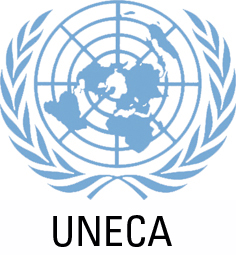Focal point
Location
P.O. Box 3001
Addis Ababa, Ethiopia
Established by the Economic and Social Council (ECOSOC) of the United Nations (UN) in 1958 as one of the UN's five regional commissions, ECA's mandate is to promote the economic and social development of its member States, foster intra-regional integration, and promote international cooperation for Africa's development.
Made up of 54 member States, and playing a dual role as a regional arm of the UN and as a key component of the African institutional landscape, ECA is well positioned to make unique contributions to address the Continent’s development challenges.
ECA’s thematic areas of focus are as follows:
- Macroeconomic Policy
- Regional Integration and Trade
- Social Development
- Natural Resources
- Innovation and Technology
- Gender
- Governance
Members:
Resources
Displaying 511 - 515 of 872Report of expert consultations on prevention of encroachment on arable land in African
The expert group meeting was held in the spirit of the Lagos Plan of Action9 particularly chapters I and IX dealing with Food and Agriculture, and UNEP Governing Council decision GC.11/7 of May 19C3 on the programme budget, for 1984, part eight on the Regional Programme for Africa, dealing with, inter alia, the prevention of post harvest food losses and encroachment on arable land. The objective of the meeting was to review on-going activities and identify gaps where future activities should be directed.
Considération pour une politique des établissements humains en Afrique: le problème foncier en milieu urbain et les programmes de logement pour le plus grand nombre
La majorité des populations urbaines dans la plupart des pays africains ne disposent que de faibles revenus et ne peuvent se permettre les fortes défenses en capital nécessaires à l'acquisition d'un logement. Toutefois, il semble que, s'ils avaient la possibilité d'acquérir des terrains, les économiquement faibles seraient capables de se construire des logements relativement convenables.
Thoughts on a human settlement policy in Africa: the land problem in urban areas and housing programmes for the masses
In this document the secretariat of the Economic Commission for Africa analyses the land problem in the urban areas and housing programmes for the masses. The document is in five main parts. The first part introduces the land issue in human settlements policy and identifies areas requiring attention in the interest of an orderly use of land in urban areas.
Thoughts on a human settlement policy in Africa: the land problem in urban areas and housing programmes for the masses
In this document the secretariat of the Economic Commission for Africa analyses the land problem in the urban areas and housing programmes for the masses. The document is in five main parts. The first part introduces the land issue in human settlements policy and identifies areas requiring attention in the interest of an orderly use of land in urban areas.
Renforcement de la planification et des politiques agricoles en Afrique: partie B une redéfinition des méthodes de planification
Le présent rapport a été élaboré dans le contexte de la crise en Afrique: pénuries alimentaires; institutions inadéquates; et accroissement de la dépendance des gouvernements et des populations du continent à l'égard de décisions prises en dehors de l'Afrique. Le changement est inévitable pour l'Afrique. La question est de savoir s'il peut être modulé ou non, d'où la nécessité de planifier.


